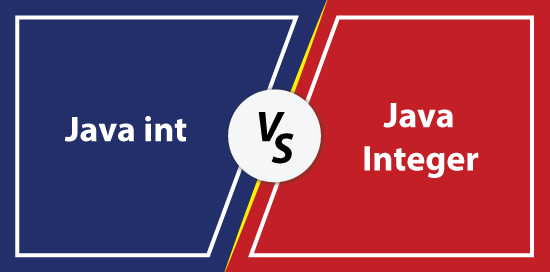int vs Integer Java
In Java, we use int and Integer to store integer types of data. Now, the question that comes from here is that if both are used to store the same type of data, then what is the difference between both of them, and why we need both of them? So, the main difference between the int and Integer is that the int is of primitive data type while the Integer is of class type. In the development of the OOPs application, int behaves according to the principle of the primitive data type. On the other hand, Integer doesn't follow the principle of primitive data type and behaves like a wrapper class.

Let's dive into detail and understand some other important differences between int and Integer.
Difference between int and Integer
| Sr. No. |
Factor |
int |
Integer |
| 1. |
Type |
An int is a primitive data type that is capable of storing 32-bit signed two's complement integer. |
An Integer is a wrapper class for the int data type that gives us more flexibility in converting, storing, and manipulating int data. |
| 2. |
Flexibility |
An int only allows the binary value of an integer in it, and due to which it is provides less flexibility. |
An Integer is a wrapper class for int and provides more flexibility in comparison to the int. |
| 3. |
Purpose |
It is used for only a single purpose, i.e., storing an integer value into memory. |
Its main purpose is to convert an int into an object or an object into an int. |
| 4. |
Memory use |
It takes 4 bytes to store an integer value in it. |
It takes 16 bytes to store an integer value in it. |
| 5. |
Base conversion |
We cannot convert the integer value of int into another base. |
The Integer class provides several useful methods, such as toBinaryString(), toOctalString(), and toHexString(), that allows us to directly convert the integer value stored in the Integer. |
| 6. |
Type Casting |
We cannot pass the decimal and string value to an int type variable. Casting is also not supported for that. |
Integer provides several ways to pass a decimal or string value to an object of Integer type. The Integer(String) and the parseInt(String) are the two ways through which we can convert a string to an int value. |
| 7. |
Operations |
Operations are not allowed because of not using the inbuilt functions. |
We can perform operations such as reversing a number, rotating it left, or rotating it right. |
Let's take some examples related to Casting, Base conversion, Operations, and Flexibility to understand the differences between both of them.
CastingExample.java
Output:

CastingExample.java
Output:

FlexibilityExample.java
Output:

|




 For Videos Join Our Youtube Channel: Join Now
For Videos Join Our Youtube Channel: Join Now










